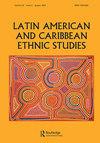‘The forest belongs to those who work it!’: multifaceted dispossession, relations of production, and ethnicity within processes of indigenous autonomy in Cherán, Mexico
IF 0.6
Q4 ETHNIC STUDIES
引用次数: 1
Abstract
ABSTRACT This article examines how the process of indigenous autonomy that began in Cherán (in the Mexican state of Michoacán) on 15 April 2011 managed to reverse the regime of violence and dispossession to which the town had been subjected as a result of the incursions of organized crime. We propose to understand this situation as a contemporary expression of multifaceted dispossession organized in pursuit of natural resources found in the forests of the Purhépecha Plateau through the historical deployment of diverse appropriation mechanisms by government and capitalist entities operating throughout the area – dynamics which have fragmented communal production logic and ethnic frameworks in Cherán and other surrounding communities. From our perspective, the antagonistic nature of this autonomy experience in the face of such power structures and their long-standing modalities lies in the possibility to mobilize economic and political initiatives – insubordinate to capitalism – through the organization of communal relations of production, the promotion of communitarian labor, and the creation of use values with the objective of satisfying common necessities.“森林属于耕耘它的人!”:墨西哥Cherán土著自治过程中的多方面剥夺、生产关系和种族
本文考察了2011年4月15日在Cherán(墨西哥Michoacán州)开始的土著自治进程如何成功地扭转了该镇因有组织犯罪入侵而遭受的暴力和剥夺政权。我们建议将这种情况理解为一种多重剥夺的当代表达,这种剥夺是通过政府和资本主义实体在整个地区运作的各种占有机制的历史部署来组织的,这些机制在Cherán和其他周围社区中分散了公共生产逻辑和种族框架。从我们的角度来看,面对这种权力结构及其长期存在的模式,这种自治经验的对抗性在于,通过组织公共生产关系、促进社区劳动和创造以满足共同需求为目标的使用价值,有可能动员经济和政治主动性——不服从资本主义。
本文章由计算机程序翻译,如有差异,请以英文原文为准。
求助全文
约1分钟内获得全文
求助全文
来源期刊

Latin American and Caribbean Ethnic Studies
Social Sciences-Cultural Studies
CiteScore
1.30
自引率
16.70%
发文量
22
 求助内容:
求助内容: 应助结果提醒方式:
应助结果提醒方式:


